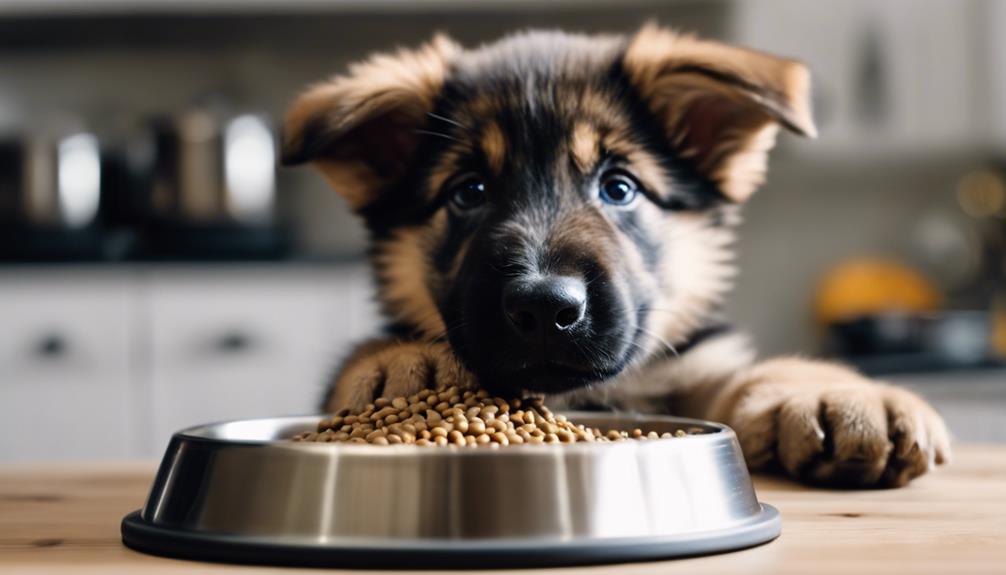🐾 Paw-some Partnership Alert! 🐾
As a pack of German Shepherd enthusiasts at MixGermanShepherd.com, we're always sniffing out the best products for our furry friends. Guess what? When you fetch something from Amazon through our links, we earn a little treat! 🦴
When it comes to feeding schedules and tips for your German Shepherd mix puppy, did you know that their nutritional needs evolve as they grow? Understanding the importance of tailored feeding routines and portion control can significantly impact your puppy's health. By implementing a balanced diet and considering specific dietary requirements, you can ensure your furry companion thrives. But, there's more to learn about optimizing their feeding schedule to promote overall well-being.
Key Takeaways
- Tailor diet to size, age, and activity level for optimal nutrition.
- Choose high-quality food for balanced growth and health.
- Monitor weight and adjust feeding amounts regularly.
- Consult a vet for personalized feeding plans and to address any health concerns.
Feeding Guidelines for German Shepherd Mix Puppies

When feeding your German Shepherd mix puppy, it is crucial to tailor their diet to meet their specific nutritional requirements based on factors such as size, age, and activity level. German Shepherd mix puppies have varying nutritional needs, so considering these factors is essential in ensuring they receive the proper nourishment for their growth and development. Due to their potentially large size, these puppies may require more calories to support their energy levels and overall health. Monitoring their growth and weight regularly will help you adjust their feeding amounts accordingly to prevent overfeeding or underfeeding.
Consulting with a veterinarian is highly recommended to create a personalized feeding plan that suits your German Shepherd mix puppy's individual needs. A balanced diet consisting of high-quality food is crucial to support their overall health and well-being. By providing the right nutrients in the correct amounts, you can help your puppy thrive and grow into a healthy adult dog.
Establishing a Feeding Routine

How can you effectively establish a feeding routine for your German Shepherd mix puppy to ensure their health and well-being? To create a healthy feeding schedule for your German Shepherd mix puppy, consistency is key. Set specific feeding times each day and stick to them to establish a routine. Monitor your puppy's weight regularly and adjust the amount of food accordingly to support their growth and prevent overfeeding. It's important to provide a quiet and calm environment during meal times to encourage good behavior and prevent distractions. Utilize high-quality puppy food designed for large breeds to meet the specific nutritional needs of your German Shepherd mix. Additionally, incorporate healthy treats like carrots or apple slices during training sessions to reinforce positive behavior and offer variety in their diet.
| Feeding Schedule | Weight Monitoring | Mealtime Behavior |
|---|---|---|
| Consistent times | Regular weight checks | Quiet environment |
| Specific amounts | Adjust according to weight | Encourage good behavior |
| High-quality food | Prevent overfeeding | Prevent distractions |
Choosing the Right Food

To ensure optimal health and development for your German Shepherd mix puppy, selecting the appropriate food that aligns with their size, age, and activity level is crucial. Look for puppy food specifically formulated for large breeds, as these diets are designed to support healthy growth and development. Opting for high-quality, balanced diets is essential, ensuring your puppy receives the necessary nutrients like protein, fats, vitamins, and minerals. Avoid foods with fillers, artificial additives, and excessive fat content, as these may not meet the nutritional requirements of your growing puppy.
Consulting with a vet is highly recommended when choosing the right food for your German Shepherd mix puppy. A veterinarian can provide personalized recommendations based on your puppy's specific needs. By seeking professional advice, you can ensure that the food you select will promote your puppy's overall well-being and support their growth into a healthy adult dog. Remember, the quality of food you provide plays a significant role in your puppy's current and future health.
Portion Control Tips

For optimal health and weight management in your German Shepherd mix puppy, it is essential to carefully monitor and control their food portions. Portion sizes play a crucial role in preventing overfeeding and maintaining a healthy weight. Utilizing measuring cups to accurately portion out the appropriate amount of food based on your puppy's age, weight, and activity level is key to ensuring they receive proper nutrition. Establishing a consistent feeding schedule rather than free-feeding helps regulate meal times and prevents excessive consumption. Consulting with your veterinarian for personalized recommendations on portion control tips can provide tailored guidance specific to your German Shepherd mix puppy's needs. By following feeding guidelines and seeking professional advice, you can support your puppy's growth and overall well-being effectively.
| Portion Control Tips for German Shepherd Mix Puppies | |
|---|---|
| Monitor Portion Sizes | Use Measuring Cups |
| Follow Feeding Guidelines | Establish a Feeding Schedule |
Feeding Frequency Recommendations

Feeding your German Shepherd mix puppy at least three times a day is recommended to support their growth and development during the crucial early months. As German Shepherd mixes are medium to large-sized dogs, it's important to adjust the feeding frequency based on their weight and age. Monitoring their caloric intake is essential to ensure they receive the necessary nutrition throughout the day. By adapting the feeding schedule according to your puppy's energy and activity levels, you can help them maintain a healthy weight as they grow. Consulting with a veterinarian is key to creating a tailored feeding plan that meets your German Shepherd mix puppy's specific dietary needs. Remember, providing proper nutrition through a consistent feeding routine is vital for the development and well-being of your furry companion.
Addressing Weight Concerns Safely

When it comes to addressing weight concerns in German Shepherd mix puppies, it's crucial to monitor their growth progress carefully. By following healthy weight guidelines and regularly checking their body condition score, you can ensure they are developing properly. Adjusting feeding amounts and incorporating exercise into their routine are key steps in managing weight safely and promoting their overall well-being.
Healthy Weight Guidelines
Regularly monitoring your German Shepherd mix puppy's weight is crucial to ensure they remain within healthy weight guidelines. Adjust their feeding amounts according to their age, size, and activity level to support their ideal weight. Consulting with your veterinarian will provide personalized guidance on managing your puppy's weight concerns safely. Be cautious of overfeeding or underfeeding, as these can lead to weight-related health issues. Incorporating regular exercise and playtime into your puppy's routine is essential for maintaining their overall health and weight management. By following these guidelines and staying attentive to your puppy's weight, you can help them grow into a healthy and happy adult dog.
Monitoring Growth Progress
To ensure the healthy growth and development of your German Shepherd mix puppy, it is crucial to monitor their progress regularly, particularly in addressing any weight concerns safely. Here are some key points to keep in mind:
- Regular Weigh-ins: Weigh your puppy consistently to track their growth progress and ensure they fall within healthy weight ranges.
- Consult Your Veterinarian: Seek guidance from your vet regarding any weight concerns and for advice on necessary feeding adjustments.
- Preventing Health Issues: Monitoring your puppy's growth progress helps prevent issues like obesity or undernourishment.
- Optimal Weight Maintenance: Adjust feeding amounts based on age, activity level, and body condition score to maintain your German Shepherd mix puppy at an optimal weight for their overall health and well-being.
Dealing With Digestive Issues

Dealing effectively with digestive issues in German Shepherd mix puppies requires prompt identification of potential causes and appropriate management strategies. Diarrhea in these puppies can stem from various sources such as infections, toxins, parasites, stress, or dietary changes. If your German Shepherd mix puppy is experiencing digestive issues, it is crucial to seek veterinary consultation for proper diagnosis and treatment. Management may involve medication, dietary modifications, and closely monitoring hydration levels. Optimal foods for these puppies during digestive problems include bland options like chicken and rice, shredded chicken, pumpkin, bone broth, and yogurt. It is essential to pinpoint the root cause of the digestive issue to provide targeted care and maintain their overall well-being. Regularly observing stool consistency, hydration levels, and general health can aid in effectively managing and resolving digestive issues in your German Shepherd mix puppy.
Suitable Chew Options

When choosing suitable chew options for your German Shepherd mix puppy, consider interactive toys and durable chew bones to satisfy their teething needs. Providing appropriate chew toys not only helps with dental health but also keeps your puppy engaged and mentally stimulated. By offering a variety of chew options, you can prevent your puppy from chewing on inappropriate items and ensure their safety and well-being.
Chew Toy Options
For your German Shepherd mix puppy, providing durable and safe chew toys is essential to satisfy their natural urge to chew and prevent destructive behavior. When choosing chew toys, opt for those made of safe materials like rubber or nylon to ensure your puppy's safety during play. Interactive toys with treats inside can keep your German Shepherd mix puppy engaged, mentally stimulated, and promote dental health. Remember to supervise your puppy while they chew to prevent any accidents or ingestion of small toy parts. Additionally, rotating different chew toys regularly will help prevent boredom and maintain your puppy's interest in chewing, ensuring they stay happy and healthy.
Teething Relief Solutions
To alleviate teething discomfort for your German Shepherd mix puppy, consider offering frozen carrots, bully sticks, or rubber toys as suitable chew options. Chewing on these items not only helps soothe your puppy's gums during teething but also promotes good dental hygiene. It's essential to avoid hard items like antlers or bones that could potentially harm their teeth, opting instead for softer and safe alternatives. Rotate different chew toys regularly to keep your puppy engaged and prevent boredom. Remember to supervise your puppy while they chew to ensure their safety and to prevent any accidental ingestion of small toy parts. By providing these appropriate chew options, you can help your German Shepherd mix puppy through the teething phase comfortably.
Ensuring Balanced Nutrition

Ensuring your German Shepherd mix puppy receives a balanced diet is crucial for their growth and development. To provide optimal nutrition for your furry companion, consider the following:
- Choose High-Quality Puppy Food: Opt for a premium puppy food specifically formulated for large breeds like German Shepherd mixes to meet their specific nutritional requirements.
- Incorporate Diverse Nutrients: Include a variety of protein sources, complex carbohydrates, and essential fatty acids in their diet to support overall health and well-being.
- Monitor Weight Regularly: Keep an eye on your puppy's weight and adjust their feeding amounts accordingly to prevent issues related to overfeeding or underfeeding.
- Consult with a Veterinarian: Seek guidance from a veterinarian to tailor a feeding plan that caters to your German Shepherd mix puppy's individual needs, ensuring they thrive and maintain optimal health.
Frequently Asked Questions
What Is a Good Feeding Schedule for a German Shepherd Puppy?
A good feeding schedule for a German Shepherd puppy involves three meals a day until 6 months of age, then transitioning to two meals. Adjust portion sizes based on growth, weight, and activity level. Provide consistent meal times for digestive health and metabolism regulation.
When Should I Switch My German Shepherd Puppy to 2 Meals a Day?
When transitioning your German Shepherd puppy to 2 meals a day, consider meal timing, portion control, and nutritional needs. Monitor growth stages, appetite changes, and digestive health during this transition period for proper weight management and dietary adjustments.
What Is the Feeding Schedule for Puppies and Dogs?
To maintain a healthy feeding routine for your puppy, consider puppy nutrition, meal portions, treat options, feeding frequency, water intake, food allergies, feeding habits, snack choices, digestive health, and weight management. Consistency is key for their well-being.
What Should I Feed My German Shepherd Mix?
To properly nourish your German Shepherd mix, focus on high-quality food rich in protein sources for a balanced diet. Control portions, feed regularly, and cater to their nutritional needs for puppy growth. Consider treat options, digestive health, allergies, and weight management.
Conclusion
In conclusion, remember that "you are what you eat." By following the feeding guidelines and tips for German Shepherd mix puppies, you are investing in their long-term health and well-being. Establish a routine, choose the right food, control portions, and monitor their weight to ensure they grow up strong and healthy. Remember, a balanced diet and proper care will lead to a happy and thriving pup.
